- Home
- Stephen E. Ambrose
The Men of World War II Page 5
The Men of World War II Read online
Page 5
There was a lot of night work, Gordon recalled. “We would cut across country and crawl over fences and through gaps and go through woods and wade creeks.” In the process, the members of the squads and platoons, already familiar with each other, grew intimate. “I could see a silhouette at night,” Gordon said, “and tell you who it was. I could tell you by the way he wore his hat, how the helmet sat on his head, how he slung his rifle.” Most of what they learned in the training proved to be valuable in combat, but it was that intimacy, that total trust, that comradeship that developed on those long, cold, wet English nights that proved to be invaluable.
They were jumping on a regular basis, in full gear, learning how to use their risers to guide themselves to open, plowed fields rather than come down on a hedgerow, road, telephone pole, stone wall, or woods. In the C-47s in the cold, damp English air, their feet were numb by the time the green light went on, so that when they hit the ground the feet stung and burned from the shock. A major purpose of the jumps was to learn to assemble quickly after landing, not so easy to do for the 2d platoon of Easy on the first jump, as the platoon came down twenty-five miles from the drop zone (DZ).
• • •
There was tension. Members of the 82d Airborne, stationed nearby, would tell the troopers from the 101st what combat in North Africa, Sicily, and Italy had been like. The officers especially felt the pressure of combat coming on, none more so than Sobel. “It showed up in his disposition,” Winters said. “He was becoming more sour and sadistic. It was reaching the point that it was unbearable.”
Sgt. Earl Hale recalled that “There was a lottery going on about whoever gets Sobel.” Sobel had picked up an Air Force sheepskin jacket, of which he was proud and which he wore in the field, making him highly conspicuous. Tipper remembered that when the company was going through a combat range with live ammunition fired at pop-up targets, “Sobel experienced some near misses. More than one shot was aimed from the rear and side to crack by close to Sobel’s head. He’d flop down, kind of bounce around and shout something, and jump up again. There was much laughing and gesturing from the men. I can’t believe that Sobel thought what was happening was accidental, but maybe he did. Anyway, he kept jumping up and down and running around as if everything were normal.”
The men continued to play tricks on Sobel. Pvt. George Luz could imitate voices. One night E Company was leading the battalion on a cross-country march. The barbed-wire fences kept slowing the progress. Sobel was in front.
“Captain Sobel,” a voice called out, “what’s the holdup?”
“The barbed wire,” Sobel replied, thinking he was addressing Maj. Oliver Horton, the battalion executive officer.
“Cut those fences,” Luz called out, continuing to imitate Horton’s voice. “Yes, sir!” Sobel replied, and he ordered wire cutters to the front.
The next morning a contingent of Wiltshire farmers confronted Colonel Strayer. They complained mightily about the cut fences. Their cows were wandering all over the landscape. Strayer called in Sobel. “Why did you cut those fences?”
“I was ordered to cut them, sir!”
“By whom?”
“Major Horton.”
“Can’t be. Horton’s on leave in London.” Sobel caught hell, but he was never able to learn who had fooled him and was therefore unable to retaliate.
It was his jumping around, his “Hi-ho, Silver!” nonsense, his bull-in-the-china-shop approach to tactical problems, that bothered the officers, N.C.O.s, and enlisted men of the company more than his chickenshit. Dissatisfaction grew daily, especially with the N.C.O.s. Sgts. Myron “Mike” Ranney, a twenty-one-year-old from North Dakota, of 1st platoon, and “Salty” Harris of 3d platoon, led the mumble-mumble of the potential disaster of Sobel leading the company into combat. The N.C.O.s were fully aware that they were confronted by a delicate and extremely dangerous situation. To act would open them to charges of insubordination or mutiny in time of war; to fail to act could get the whole company killed.
Ranney, Harris, and the other N.C.O.s hoped that the platoon leaders would bring the problem to Colonel Sink, or that Sink would become aware of the situation on his own and that Sink would then quietly remove Sobel. But that seemed naive. How could young officers whose responsibility was to back up their C.O. go to the colonel to complain about the C.O.? And what would they complain about? Company E continued to lead the way in the regiment, in the field, in barracks, in athletic contests. How could the N.C.O.s expect Colonel Sink to do other than support his company commander in the face of dissension and pressure from a group of sergeants and corporals? These guys were getting ready to go into combat against the most-feared army in the world, not to play a game or have a debate.
So the mumble-mumble continued, and Sobel and 1st Sergeant Evans remained isolated, but still very much in command.
• • •
Weekend passes and the excellent British rail service gave the men a break from the tension. England in the late fall and early winter of 1943 was a wonderland for the boys from the States. Most of the British boys their age were off in Italy or in training camps far from their homes, so there were lonely, bored, unattached young women everywhere. The American soldiers were well-paid, much better than the British, and the paratroopers had that extra $50 per month. Beer was cheap and plentiful, once out of Aldbourne all restraints were removed, they were getting ready to kill or be killed, they were for the most part twenty or twenty-one years old.
Webster described the result in an October 23 diary entry: “Although I do not enjoy the army, most of the men in this outfit find it a vacation. Boys who had been working steadily at home enter the army and are relieved of all responsibilities. It is unanimously agreed that they never pitched such glorious drunks back home.”
The excitement of the time, the kaleidoscope of impressions that were continually thrust upon them, the desperate need to escape the rigors of training, the thought of upcoming combat and Sobel’s chickenshit, combined to make this an unforgettable time and impel most of the men to make the most of it. “London to me was a magic carpet,” Carson wrote. “Walk down any of its streets and every uniform of the Free World was to be seen. Their youth and vigor vibrated in every park and pub. To Piccadilly, Hyde Park, Leicester Square, Trafalgar Square, Victoria they came. The uniforms of the Canadians, South Africans, Australians, New Zealanders, the Free French, Polish, Belgium, Holland, and of course the English and Americans were everywhere.
“Those days were not lost on me because even at twenty years of age, I knew I was seeing and being a part of something that was never to be again. Wartime London was its own world.”
There was an excess of drinking, whoring, fighting. Older British observers complained, “The trouble with you Yanks is that you are overpaid, oversexed, and over here.” (To which the Yanks would reply, “The trouble with you Limeys is that you are underpaid, undersexed, and under Eisenhower.”)
• • •
E Company was adding officers, with the aim of having two lieutenants per platoon, in expectation of casualties when combat began. One newcomer was 2d Lt. Lynn “Buck” Compton. Born on the last day of 1921 in Los Angeles, he was an all-American catcher on the UCLA baseball team and played football for UCLA in the January 1, 1943, Rose Bowl game. Upon graduation from OCS he went to Fort Benning. After completing jump school, he joined E Company in Aldbourne in December. “I remember feeling rather envious of those who had been at Toccoa,” he wrote years later, “and felt sort of ‘out of it’ as a new member of the company.”
Compton quickly learned that Lieutenant Nixon, now battalion S-2, resented “jocks.” Nixon put Compton in charge of physical training for the battalion, which in practice meant Compton had to lead the battalion on long runs, the only officer who had to do so. Whether as a result of this experience, or because of his athletic background, or because he liked to gamble, Compton was close to the N.C.O.s and some of the enlisted men. Too close, some of the other officers felt. He
got caught playing craps with some of the men and drew a reprimand from the X.O., Lieutenant Winters.
• • •
At 1100 hours on October 30, Lieutenant Colonel Strayer was scheduled to inspect E Company. Sobel gave Lieutenant Winters orders to inspect the latrine at 1000 hours. A few minutes later, at about 0930 hours, Lieutenant Colonel Strayer told Winters to censor the enlisted men’s mail. That was a job that could not be done at headquarters, so Winters hopped on his bicycle and rode to his quarters, a small room in a private home in Aldbourne. Promptly at 1000 hours he returned, parked his bicycle outside the barracks, and entered to inspect the latrine. To his surprise, Sobel was there, making his own inspection.
Sobel walked past Winters, head down, giving no indication that he saw the X.O. Behind him walked a most unhappy Pvt. Joachim Melo, carrying a mop, soaking wet, dirty, badly needing a shave, hair uncombed. Sobel left without saying a word. Winters inspected the latrine and found that Melo had done a good job.
At 1045 hours Winters walked into the orderly room to get ready for the company formation. With a hint of a smirk on his face, 1st Sergeant Evans handed him a typed document. It read:
Company E, 506th PIR, 30 Oct. ’43
Subject: Punishment under 104th A[rticle of] W[ar]
To: 1st Lt. R. D. Winters
1. You will indicate by indorsement [sic] below whether you desire punishment under 104th AW or trial by Courts Martial for failure to inspect the latrine at 0945 this date as instructed by me.
[Signed, with a grand flourish]
Herbert M. Sobel, Capt., Commanding.
Winters confronted Sobel. “Captain,” he said after saluting and asking permission to speak, “my orders were to inspect the latrine at 1000 hours.”
“I changed that time to 0945.”
“No one told me.”
“I telephoned, and I sent a runner.” Winters bit his tongue. There was no telephone in his room, and no runner had come.
It was time for inspection. Strayer went down the ranks and through the barracks. Everything, including the latrine, was satisfactory. Winters, meanwhile, made up his mind on how to respond to Sobel. On the bottom of the typed sheet, he wrote by hand:
Subject: Punishment under 104 A.W. or Trial by Courts Martial.
To: Capt. H. M. Sobel
1. I request trial by Courts Martial for failure to inspect the latrine at 0945 this date.
Lt. R. D. Winters, XO, Co. E
Sobel replied the following day:
1. You will be denied a 48 hour pass until after December 15, 1943.
2. In accordance with the procedure outlined in the Courts-Martial Manual you will iniutate [initiate; Sergeant Evans evidently had trouble either typing or spelling] your own letter of appeal with your reasons for objection and also a request for trial by courts-martial.
Winters simmered for three days. So far as he could make out, Sobel was saying, “Look, don’t be silly, take the punishment and forget the courts-martial.” Sobel knew that the “punishment” was a matter of indifference to Winters, as Winters spent his weekends on the post, reading or playing sports. But Winters had had enough. He wanted to force the moment to a crisis. The competition he had never wanted, between himself and Sobel for leadership of E Company, had to be settled. The company was not big enough for both of them.
On November 4, Winters appealed his punishment under the 104th Article of War. Sobel made an “indorsement” [Evans’s spelling] the next day:
1. Punishment for the above offense given by the undersigned will not be lifted by him.
2. When given another task to perform by a ranking officer to myself [Strayer’s order to censor the mail] you should have delegated your task to another officer to inspect the latrine and not let it go until such time that there was little time for corrective measures to be taken before the arrival of the General Officer about ten minutes later.
He signed with his usual flourish.
Winters’s request for a court-martial, meanwhile, was posing a problem that was not as funny as it sounded for the 2d Battalion staff. The officers got out the court-martial manual and studied it intensively to try to figure out some way to get out from under this embarrassment. They finally did, and Strayer set aside the punishment and declared the case closed—no court-martial.
Sobel was not finished. The next day, November 12, Evans handed Winters another typed order:
Subject: Failure to Instruct Latrine Orderly
To: 1st Lt. R. D. Winters
1. You will reply by indorsement hereon your reason for failure to instruct Pvt. J. Melo in his duties as latrine orderly.
2. You will further reply why he was permitted to be on duty at 1030 Oct. 30 in need of a shave.
“I give up,” Winters decided. “Go ahead and shoot me.” In that mood he replied, by endorsement:
1. Reason for failure to instruct Pvt. J. Melo in his duties as latrine orderly: No excuse.
2. Reason why he was permitted to be on duty at 1030 hr in need of a shave: No excuse.
The next day Strayer decided, for the good of E Company (where, naturally, the long-anticipated showdown between Sobel and Winters was the talk of the barracks), to transfer Winters out of Easy. Strayer made him battalion mess officer.
That was an insult to Winters, in his view: “You only give a job like that to a guy that can’t do anything right.”
• • •
With Winters gone, Sobel still in charge, and combat coming, the N.C.O.s were in an uproar. Sergeants Ranney and Harris called a meeting. With the exception of Evans and one or two others, all the N.C.O.s in E Company attended. Ranney and Harris proposed that they present Colonel Sink with an ultimatum: either Sobel be replaced, or they would turn in their stripes. They stressed that they would have to act together, with no dissenters and no identifiable leader.
This radical proposal elicited much comment, many questions, great concern, but in the end the group decision was that going into combat under Sobel’s command was unthinkable. The only way they could let Strayer and Sink know how strongly they felt was to turn in their stripes. Each noncom thereupon wrote out his own resignation: Lipton’s went as follows: “I hereby turn in my stripes. I no longer want to be a non-commissioned officer in Company E.” Lipton was C.Q. (charge of quarters, the sergeant who slept in the orderly room to be available to handle any problems that came up during the night, to wake the men in the morning, etc.) that night. He gathered up the resignations and put the stack in Sobel’s “in” basket.
The N.C.O.s then thought further about what they were doing and decided to consult with Winters. He was invited to the orderly room, where on arrival Ranney told him what the group had done.
“Don’t,” said Winters. “Don’t even think about it. This is mutiny.”
The N.C.O.s protested. As the discussion continued, Sobel walked in. Everyone was speechless. Sobel did not say a word, he just walked over to his desk and picked up a book. As he turned to leave, Ranney said in a normal voice, “Now, Lieutenant Winters, what are we going to do about improving our athletic program?” Sobel gave no hint of concern, he just walked out.
Winters felt that Sobel had to have known what was going on. “Hell, there was no secret about it.” Ranney had invited Evans to the meeting; it was all but certain Evans had told Sobel.
Indeed, by this time the whole battalion was talking about Sobel’s battles, first with Winters, now with his N.C.O.s. Sink would have had to have been deaf, dumb, and blind not to have been aware. He should also have been grateful that Winters had talked the N.C.O.s out of presenting him with an ultimatum. A few days later, Sink came down to Company E, called all the noncoms together, and as Lipton recalled, “Gave us hell. He told us we disgraced our company and that he could put every one of us in the guardhouse for years. As we were preparing for combat, he said that it could be called mutiny in the face of the enemy for which we could be shot.”
Fortunately for Sink, the 101st Airborne had just es
tablished a Parachute Jumping School at the nearby village of Chilton Foliat, in order to qualify as paratroopers doctors, chaplains, communications men, forward artillery observers, and others who would be jumping on D-Day. Who better than Sobel to run a training camp?
Sink sent Sobel to Chilton Foliat and brought 1st Lt. Patrick Sweeney from Able Company to be X.O. of Easy. He made 1st Lt. Thomas Meehan of Baker the C.O. of Easy. And he brought Winters back, as leader of the 1st platoon. Sergeant Ranney was busted to private, and Harris was transferred. The Sobel era of Easy Company had come to an end.
• • •
Meehan was Sobel’s opposite. Slender, fairly tall, willowy, he had common sense and competence. He was strict but fair. He had good voice command. “Under Meehan,” Winters said, “we became a normal company.”
• • •
Training intensified. On December 13, the company made a night jump and lost its first man, Pvt. Rudolph Dittrich of 1st platoon, due to parachute failure. Platoons and squads were being sent out on three-day problems, with different men being put in command as lieutenants and sergeants were declared out of action. “Imagine me platoon leader,” Carson wrote in his diary on December 12. “No, it can’t be.” But it was. They were learning to be resourceful, which included learning to live off the land. This included “fishing” by tossing hand grenades into the streams and improving their diet by finding deer on the country estates that were willing to walk into a bullet in the head.
Christmas was a day off, with all the turkey a man could eat. New Year’s Eve was quiet. “We just waited up for the New Year,” Carson wrote. “I wonder what it shall bring, wonder how many of us will see 1945.”

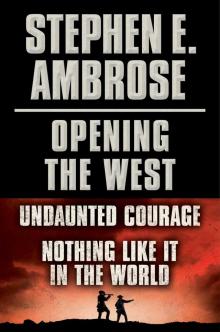 Undaunted Courage
Undaunted Courage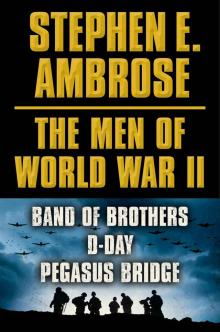 The Victors: Eisenhower and His Boys
The Victors: Eisenhower and His Boys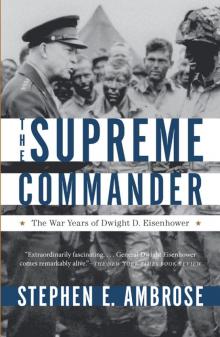 The Supreme Commander
The Supreme Commander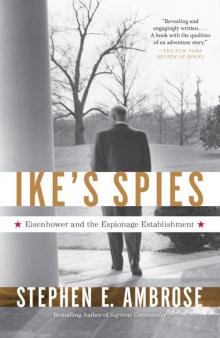 Ike's Spies: Eisenhower and the Espionage Establishment
Ike's Spies: Eisenhower and the Espionage Establishment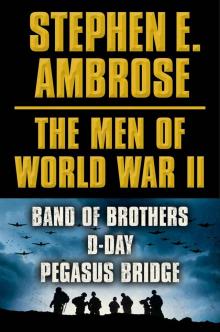 The Men of World War II
The Men of World War II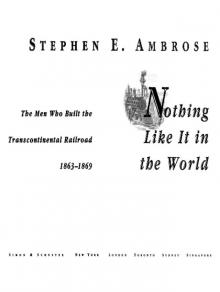 Nothing Like It in the World The Men Who Built the Transcontinental Railroad 1863-1869
Nothing Like It in the World The Men Who Built the Transcontinental Railroad 1863-1869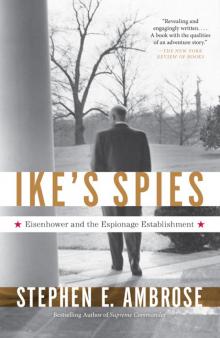 Ike's Spies
Ike's Spies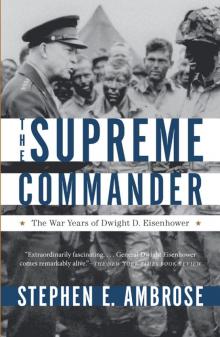 Supreme Commander
Supreme Commander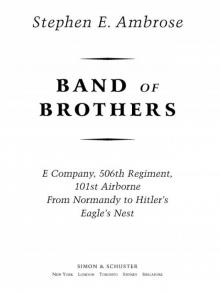 Band of Brothers
Band of Brothers